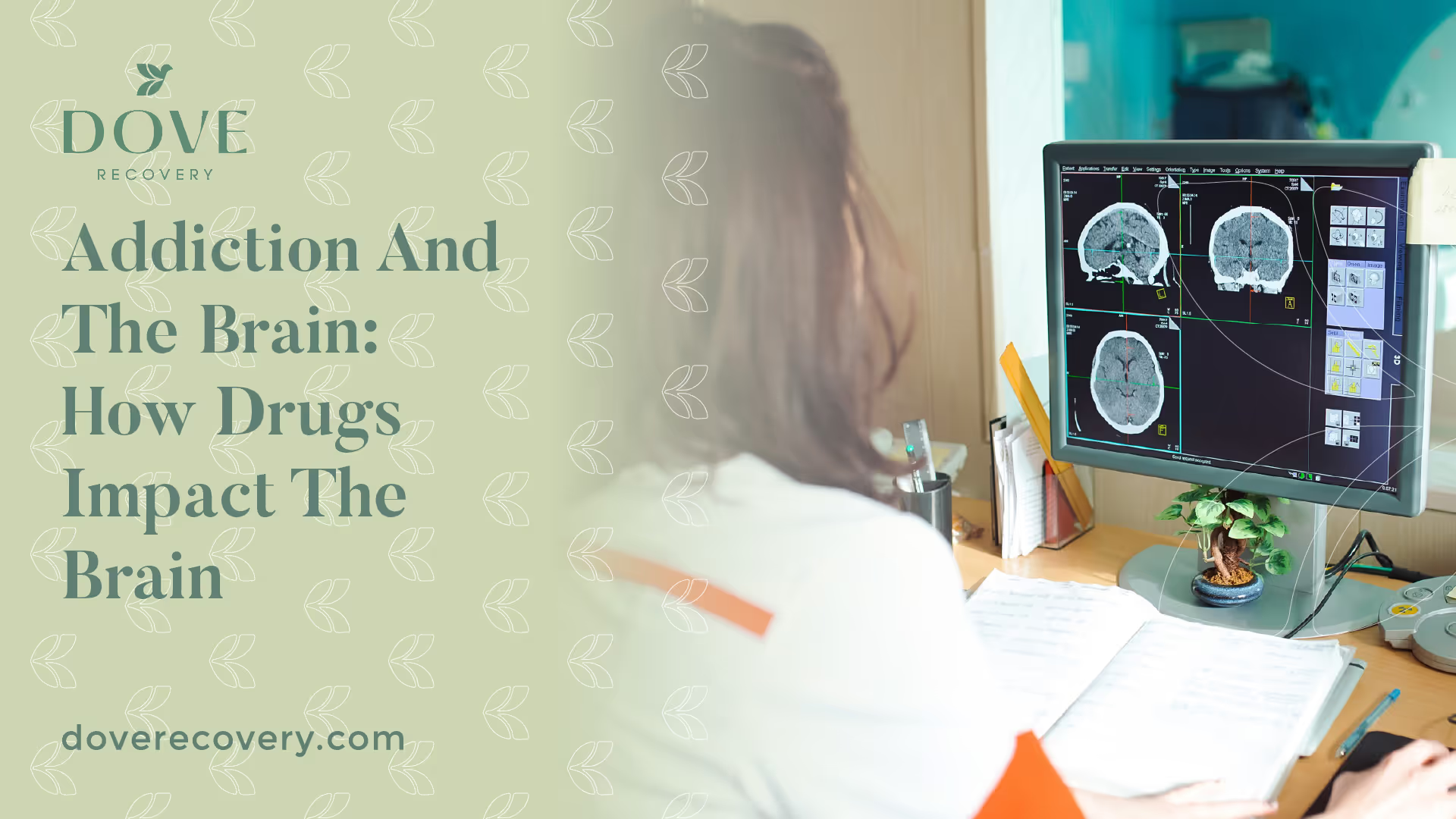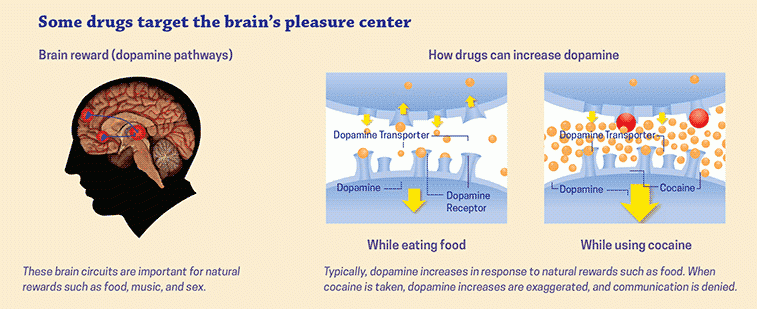Addiction And The Brain: How Drugs Impact The Brain
.avif)
How Do Drugs Work in the Brain?
Addiction is a complex and often misunderstood phenomenon. While many people think of addiction as a sign of moral weakness or poor decision-making, the reality is that addiction is a disease that affects the brain in profound ways.

Substance abuse can have long-lasting effects on the brain, altering both its structure and function. In this article, we’ll explore the science behind addiction and how it impacts the brain, as well as some of the most common substances of abuse.
Drugs work in the brain by altering its normal functioning. Different drugs have different mechanisms of action, but they all affect the way neurotransmitters are released and received in the brain.
For example, some drugs like opioids bind to receptors in the brain that normally respond to endorphins – natural pain-relieving chemicals produced by the body. By mimicking these endorphins, opioids can produce feelings of euphoria and pain relief.
Other drugs like cocaine and amphetamines increase the levels of dopamine – a neurotransmitter associated with pleasure and reward – in the brain. This flood of dopamine can produce intense feelings of pleasure and energy, but it can also lead to addiction as the brain becomes dependent on these artificially high levels of dopamine.
It’s important to note that not all drug use leads to addiction, but repeated exposure to drugs can change the way the brain functions, making it more difficult for individuals to quit using them.
The Science of Addiction
Addiction is characterized by compulsive drug-seeking and drug-taking behavior, despite the negative consequences that result. While the initial decision to use drugs may be voluntary, continued use can lead to changes in the brain that make it difficult to quit.
One of the key brain regions involved in addiction is the mesolimbic dopamine system. This system is responsible for the release of dopamine, a neurotransmitter that is associated with feelings of pleasure and reward.
When a person uses drugs, they flood the brain with dopamine, creating an intense and pleasurable high. However, with repeated drug use, the brain’s reward system can become desensitized, leading to a need for higher doses of the drug to achieve the same effect.
Over time, drug use can also lead to changes in the prefrontal cortex, the region of the brain responsible for decision-making, impulse control, and judgment. These changes can make it difficult for a person to resist drug cravings and make rational decisions about their substance use.
The Impact of Substance Abuse on the Brain's Reward System

Substance abuse can have a profound impact on the brain's reward system, which is responsible for releasing dopamine and producing feelings of pleasure and reward. Over time, drug use can cause changes in the way the brain processes dopamine, leading to a desensitization of the reward system.
As a result of these changes, individuals may need to use increasingly larger doses of drugs to achieve the same pleasurable effects they once experienced. This phenomenon is known as tolerance and is a hallmark of addiction.
In addition to altering dopamine levels, substance abuse can also lead to changes in other neurotransmitters that affect mood and behavior. For example, chronic alcohol use can increase levels of gamma-aminobutyric acid (GABA), which slows down brain activity and produces feelings of relaxation.
These changes in neurotransmitter levels can make it difficult for individuals to experience pleasure or enjoyment from activities they once found rewarding. This inability to feel pleasure is known as anhedonia and is a common symptom of depression, which frequently co-occurs with substance abuse disorders.
Overall, substance abuse can have far-reaching consequences for the brain's reward system, leading to long-term changes that make it difficult for individuals to quit using drugs or find enjoyment in other aspects of their lives.
Common Substances of Abuse
While addiction can occur with any substance, there are some drugs that are more commonly associated with addiction. Here are a few of the most common substances of abuse:
Alcohol
Alcohol is a depressant drug that can have a wide range of effects on the brain. In small amounts, alcohol can reduce inhibitions and create feelings of relaxation and euphoria. However, with continued use, alcohol can lead to addiction and long-lasting changes in the brain.
Opioids
Opioids are a class of drugs that include prescription painkillers like oxycodone and hydrocodone, as well as illegal drugs like heroin. Opioids work by binding to receptors in the brain that are involved in pain and pleasure sensations.
With repeated use, opioids can lead to physical dependence and addiction. In addition to the risk of overdose, opioids can also have long-lasting effects on the brain, leading to changes in mood, memory, and decision-making.
Stimulants
Stimulants like cocaine and methamphetamine can have a range of effects on the brain, including increased energy, focus, and feelings of euphoria. With continued use, these drugs can lead to addiction and changes in the brain that make it difficult to quit.
The Link Between Mental Health Disorders and Addiction
While substance abuse can lead to changes in the brain that contribute to addiction, it’s important to note that addiction is often linked with mental health disorders. In fact, research has shown that individuals with mental health disorders are more likely to develop substance abuse disorders than those without.
Conditions such as depression, anxiety, and post-traumatic stress disorder (PTSD) can all increase the risk of developing a substance abuse disorder. This may be due in part to the way these conditions affect neurotransmitter levels in the brain.
For example, depression is associated with lower levels of serotonin – a neurotransmitter that regulates mood and appetite. Some individuals may turn to drugs or alcohol as a way to self-medicate their symptoms of depression, leading to the development of a substance abuse disorder.
Similarly, PTSD is associated with increased levels of stress hormones like cortisol. Individuals with PTSD may use drugs or alcohol as a way to cope with their symptoms or numb themselves from painful memories.
Overall, it’s clear that there is a complex relationship between mental health disorders and addiction. Treating both conditions simultaneously is often necessary for successful recovery and long-term sobriety.
How Addiction Affects Decision-Making and Impulse Control
Addiction can have a profound impact on the brain regions responsible for decision-making and impulse control. Chronic drug use can lead to changes in the prefrontal cortex, which is responsible for these functions.
Studies have shown that individuals with addiction often struggle with decision-making and impulse control, even when they are aware of the negative consequences of their actions. This may be due in part to changes in the way the brain processes information, as well as alterations in neurotransmitter levels.
The role of serotonin
One of the key neurotransmitters involved in decision-making and impulse control is serotonin. Serotonin helps to regulate mood, appetite, and sleep, but it also plays an important role in executive function – the set of mental processes that help us plan, organize, and make decisions.
Chronic drug use can lead to a depletion of serotonin levels in the brain, making it difficult for individuals with addiction to make rational decisions or resist impulsive behaviors.
Hyperactivity in the brain
In addition, drugs like cocaine and methamphetamine can cause hyperactivity in certain parts of the brain that are involved in impulse control, leading to risky behaviors and poor decision-making.
Overall, addiction can have far-reaching effects on the brain regions responsible for decision-making and impulse control. Treating both addiction and any co-occurring mental health disorders may be necessary to help individuals regain control over their behavior and make positive changes towards recovery.
Effective Treatment Options for Addiction
While addiction can be a difficult disease to overcome, there are many effective treatment options available. Two of the most common and successful approaches include behavioral therapies and medication-assisted treatment.
Behavioral Therapies
Behavioral therapies are designed to help individuals change their attitudes and behaviors related to drug use. These therapies can be administered in individual or group settings and often involve identifying triggers for drug use, developing coping strategies, and learning new skills to manage stress and avoid relapse.
One of the most common types of behavioral therapy is cognitive-behavioral therapy (CBT), which focuses on changing negative thought patterns and behaviors that contribute to addiction. Another popular approach is motivational interviewing (MI), which helps individuals find their own motivation for change by exploring their values and goals.
Medication-Assisted Treatment
Medication-assisted treatment (MAT) involves using medications along with counseling and behavioral therapies to treat addiction. These medications can help reduce withdrawal symptoms, cravings, and the likelihood of relapse.
Some commonly used medications for MAT include methadone, buprenorphine, naltrexone, and acamprosate. Methadone and buprenorphine are often used to treat opioid addiction, while naltrexone is used for both opioid and alcohol addiction. Acamprosate is used primarily for alcohol addiction.
It’s important to note that medication-assisted treatment is not a one-size-fits-all approach. The type of medication used will depend on the individual’s specific needs and the type of substance they are addicted to. Additionally, MAT should always be administered under the supervision of a medical professional.
Overall, both behavioral therapies and medication-assisted treatment have been shown to be effective in treating addiction. In many cases, combining these two approaches can lead to even greater success in achieving long-term sobriety.
Seeking Help for Addiction
While addiction can be a difficult disease to overcome, there are effective treatments available. Behavioral therapies, medication-assisted treatment, and support groups can all be helpful tools in recovery.
If you or someone you love is struggling with addiction, it’s important to seek professional help. Talk to your doctor or a mental health professional to learn more about your options for treatment.
Conclusion
In conclusion, addiction is a complex disease that affects the brain in profound ways. Substance abuse can lead to long-lasting changes in the brain's structure and function, altering the way neurotransmitters are released and received.
While addiction can be difficult to overcome, there are many effective treatment options available, including behavioral therapies and medication-assisted treatment. It's important for individuals struggling with addiction to seek professional help and support in order to achieve long-term sobriety.
By understanding the science behind addiction and seeking appropriate treatment, individuals can take control of their lives and regain their health and well-being.
Sources:
- National Institute on Drug Abuse: https://www.drugabuse.gov/publications/drugfacts/understanding-drug-use-addiction
- https://nida.nih.gov/publications/drugs-brains-behavior-science-addiction/drugs-brain
- https://www.addictioncenter.com/addiction/addiction-brain/
